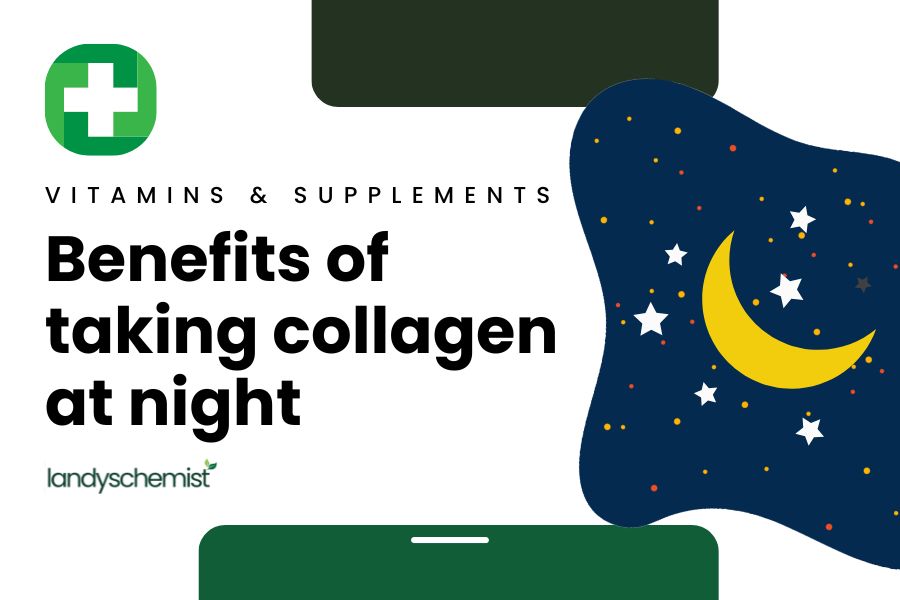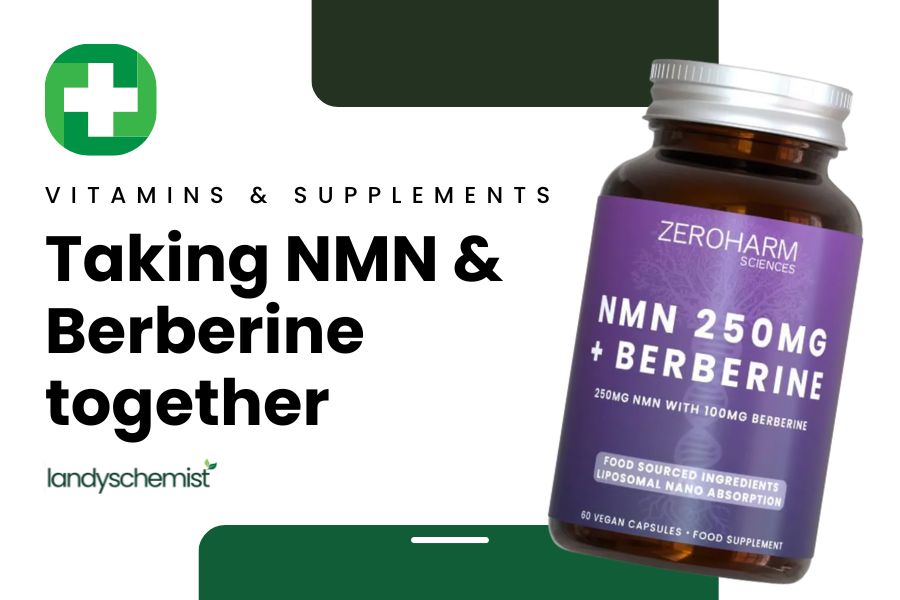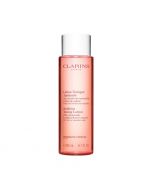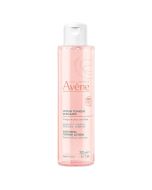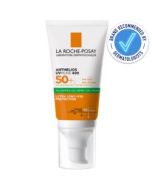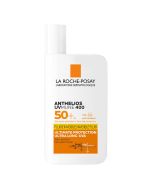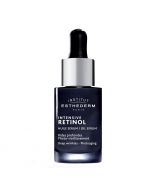
How to Get Glass Skin: A Realistic, Expert-Approved Guide
To get glass skin, follow a consistent skincare routine focused on hydration, gentle exfoliation, thorough cleansing, and daily sun protection. Glass skin describes a complexion that looks smooth, clear, and deeply hydrated - with a luminous, reflective glow. You don’t need 10+ products or unrealistic steps. With the right approach and expert-backed habits, this level of healthy skin is achievable for everyone.
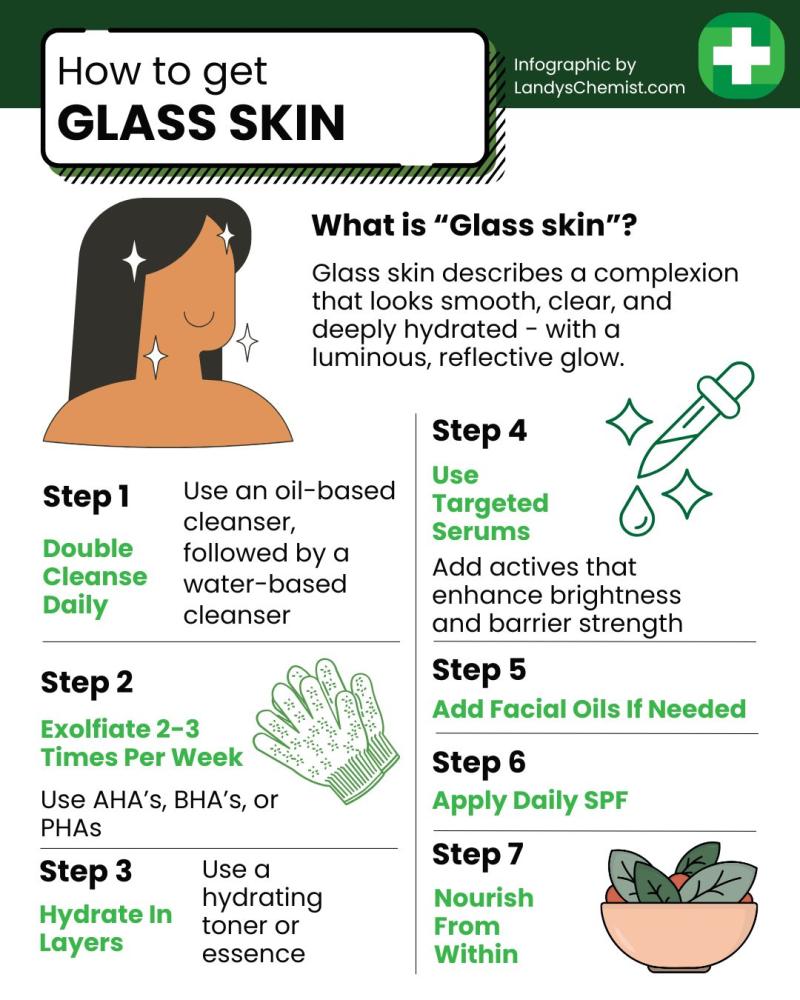
Step 1: Double Cleanse Daily
Double cleansing removes sunscreen, makeup, and daily buildup without stripping your skin.
- Start with an oil-based cleanser to lift SPF and impurities
- Follow with a gentle water-based cleanser to clean the skin surface
This leaves your skin fresh, balanced, and ready for hydration. Studies have shown that oil-based cleansers are effective at removing particulate matter and pollutants, which can otherwise contribute to inflammation and dullness. This sets the stage for healthy, balanced skin.
Step 2: Exfoliate 2–3 Times a Week
Exfoliating clears away dull skin cells, promoting smoother texture and a brighter glow. Dermatological research supports the use of exfoliating acids 2–3 times weekly for visible results without compromising skin integrity.
- AHAs like glycolic or lactic acid help resurface
- BHAs like salicylic acid target pores and oil
- PHAs are ideal for sensitive skin types
- Avoid daily exfoliation to prevent barrier damage and irritation.
Step 3: Hydrate in Layers
Glass skin relies on deep hydration, not just moisturiser. Research has confirmed that hyaluronic acid can significantly increase skin hydration and elasticity, while ingredients like panthenol and glycerin help reinforce the skin’s moisture barrier.
- Apply a hydrating toner or essence to prep the skin
- Follow with a serum rich in hyaluronic acid or glycerin
- Lock in moisture with a ceramide or panthenol-based moisturiser
Layering helps maintain a plump, dewy look throughout the day.
Step 4: Use Targeted Serums
Add actives that enhance brightness, clarity, and barrier strength. Vitamin C, for example, has been clinically shown to brighten skin, even out pigmentation, and provide antioxidant protection from environmental damage. Niacinamide is another research-backed ingredient that improves skin elasticity, reduces redness, and strengthens the skin barrier.
- Vitamin C: Brightens and protects (use in the morning)
- Niacinamide: Refines pores and supports barrier health
- Retinoids: Improve texture and tone over time (use at night)
Start using facial serums slowly and always use sunscreen alongside strong actives.
Step 5: Moisturise and Add Oils if Needed
Use a moisturiser that suits your skin type to seal in hydration.
- Look for ceramides, squalane, or shea butter
- Add a few drops of facial oil if your skin is dry or tight
Facial oils are optional, but helpful for reinforcing moisture in colder climates .For those with dry or flaky skin, adding a few drops of a facial oil at night (such as rosehip or jojoba) can provide extra nourishment and glow.
Step 6: Apply Broad-Spectrum SPF Daily
UV damage breaks down collagen and leads to dullness. Clinical research shows that regular use of broad-spectrum SPF significantly reduces photoaging and protects the skin’s collagen and barrier.
- Use at least a broad-spectrum SPF 30+ every morning
- Reapply every 2–3 hours when outdoors
- Choose dewy-finish sunscreens if you prefer extra glow
Sun protection is essential for preventing hyperpigmentation and texture issues. You can find sunscreens that protect the skin from UVA & UVB rays whilst also tackling hyperpigmentation such as the La Roche-Posay Anthelios UVMUNE 400 Anti Dark-Spot Fluid SPF50+
Step 7: Support Skin From Within
Glass skin starts on the inside. Lifestyle factors like diet, stress, sleep, and hydration all impact how your skin looks and functions.
- Eat antioxidant-rich foods (e.g. berries, greens, nuts) to help reduce oxidative stress and support collagen production
- Include omega-3s (chia, flaxseed, oily fish) to strengthen the skin barrier and reduce inflammation
- Get 7–9 hours of quality sleep to support overnight skin repair and glow — research shows poor sleep worsens sensitivity and dullness
- Manage stress daily to prevent cortisol-driven breakouts and barrier damage
- Stay hydrated to maintain circulation and skin function, even if water intake doesn’t directly moisturise your skin
“Glass skin is achievable when you focus on skin health over perfection,” says Rhysa Phommachanh, skincare specialist at Landys Chemist with over 10 years of experience in treating barrier-impaired skin.
Conclusion: Achieving Glass Skin Is About Consistency, Not Complexity
To get glass skin, you don’t need a complicated 10-step routine. You need consistent hydration, gentle cleansing, exfoliation, and sun protection. By following this structured approach and supporting your skin from the inside out you’ll build a smoother, clearer, and more radiant complexion over time. This routine, backed by expert insight and practical skincare science, is the most effective way to achieve healthy, glass-like skin that lasts.
Frequently Asked Questions
How long does it take to get glass skin?
Most people see improvements within 4–6 weeks with a consistent routine.
Can oily or acne-prone skin get glass skin?
Yes. The key is gentle hydration and barrier care. Avoid stripping or over-exfoliating.
Do I need 10 steps?
No. A focused 5–7 step routine is more sustainable and effective.
Which serums are best?
Vitamin C, niacinamide and hyaluronic acid serums are ideal for glow, clarity, and hydration.
Is retinol safe for glass skin routines?
Yes, when used correctly with moisturiser and paired with SPF, it supports texture and glow.
Sources:
- A robust sebum, oil, and particulate pollution model for assessing cleansing efficacy of human skin - PubMed
- (PDF) The clinical efficacy and tolerability of a novel triple acid exfoliating blend for reducing signs of photoaging in sensitive skin
- (PDF) Ingestion of an Oral Hyaluronan Solution Improves Skin Hydration, Wrinkle Reduction, Elasticity, and Skin Roughness: Results of a Clinical Study
- Daily Use of a Facial Broad Spectrum Sunscreen Over One-Year Significantly Improves Clinical Evaluation of Photoaging - PubMed
- Tinted sunscreens: Benefits beyond an attractive glow - Harvard Health
- (PDF) Potential Role of Dietary Antioxidants During Skin Aging
- Exploring the potential of omega‐3 fatty acids in acne patients: A prospective intervention study - Guertler - 2024 - Journal of Cosmetic Dermatology - Wiley Online Library
- Sleep Deprivation Increases Facial Skin Yellowness - PMC
- Impact of Chronic Moderate Psychological Stress on Skin Aging: Exploratory Clinical Study and Cellular Functioning
- Does dietary fluid intake affect skin hydration in healthy humans? A systematic literature review - Akdeniz - 2018
This article is for informational purposes only and is not a substitute for medical advice. Consult your doctor or healthcare provider before starting any supplements, treatments, or remedies. Ensure a varied and balanced diet and a healthy lifestyle before considering supplements. Supplements should not replace a balanced diet.


